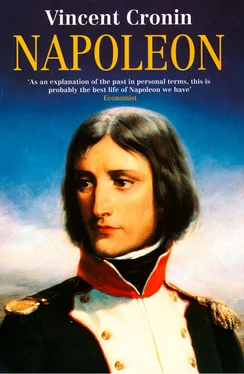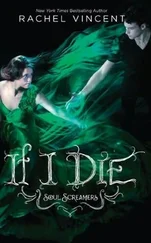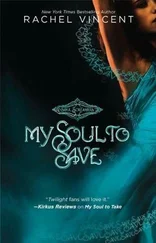Vincent Cronin - Napoleon
Здесь есть возможность читать онлайн «Vincent Cronin - Napoleon» — ознакомительный отрывок электронной книги совершенно бесплатно, а после прочтения отрывка купить полную версию. В некоторых случаях можно слушать аудио, скачать через торрент в формате fb2 и присутствует краткое содержание. Жанр: unrecognised, на английском языке. Описание произведения, (предисловие) а так же отзывы посетителей доступны на портале библиотеки ЛибКат.
- Название:Napoleon
- Автор:
- Жанр:
- Год:неизвестен
- ISBN:нет данных
- Рейтинг книги:3 / 5. Голосов: 1
-
Избранное:Добавить в избранное
- Отзывы:
-
Ваша оценка:
- 60
- 1
- 2
- 3
- 4
- 5
Napoleon: краткое содержание, описание и аннотация
Предлагаем к чтению аннотацию, описание, краткое содержание или предисловие (зависит от того, что написал сам автор книги «Napoleon»). Если вы не нашли необходимую информацию о книге — напишите в комментариях, мы постараемся отыскать её.
Napoleon — читать онлайн ознакомительный отрывок
Ниже представлен текст книги, разбитый по страницам. Система сохранения места последней прочитанной страницы, позволяет с удобством читать онлайн бесплатно книгу «Napoleon», без необходимости каждый раз заново искать на чём Вы остановились. Поставьте закладку, и сможете в любой момент перейти на страницу, на которой закончили чтение.
Интервал:
Закладка:
‘It’s obvious you’re just a little schoolgirl,’ replied Napoleon.
‘What about you? You’re just a puss-in-boots!’
Napoleon took the quip in good part. Next day out of his scant savings he bought Cécile a copy of Puss-in-Boots and her younger sister Laure a model of Puss-in-Boots running ahead of the carriage belonging to his master, the Marquis de Carabas.
Five and three-quarter years ago Napoleon had arrived in France an Italian-speaking Corsican boy. Now he was a Frenchman, an officer of the King. He had done well. But the death of his father had left him with heavy responsibilities. At the moment he was the only financial resource of his mother, a widow with eight children. He was allowed to select his regiment and because he wanted to be as close as possible to his mother, and to his brothers and sisters, he chose the La Fère regiment; not only was it one of the very best, but it was stationed in Valence, the nearest garrison town to Corsica.
CHAPTER 3 The Young Reformer
VALENCE, on the River Rhône, in Napoleon’s day was a pleasant town of 5,000 inhabitants, notable for several fine abbeys and priories and for the strong citadel built by François I and modernized by Vauban. Officers lived in billets, and Napoleon found himself a first-floor room on the front of the Café Cercle. It was a rather noisy room, where he could hear the click of billiard balls in the adjoining saloon, but he liked the landlady, Mademoiselle Bou, an old maid of fifty who mended his linen, and he stayed on with her during all his time in Valence. As Second Lieutenant his pay was ninety-three livres a month; his room cost him eight livres eight sols.
For his first nine weeks Napoleon, as a new officer, served in the ranks and got first-hand experience of the ordinary soldier’s duties, including mounting guard. The rank and file were ill paid and slept two in a bed – until recently it had been three – but at least they were never flogged, whereas soldiers in the English and Prussian armies often were: indeed a sentence of 800 lashes was not unknown.
In January 1786 Napoleon took up his full duties as a second lieutenant. In the morning he went to the polygon to manœuvre guns and practise firing, in the afternoon to lectures on ballistics, trajectories and fire power. The guns were of bronze and of three sizes: 4-, 8-, and 12-pounders. The 12-pounder, which was drawn by six horses, had an effective range of 1,200 yards. All fired metal balls of three types: solid, red-hot shot, and short-range case-shot. The guns were new – they had been designed nine years earlier – and were the best in Europe. Napoleon soon became deeply interested in everything to do with them. One day, with his friend Alexandre des Mazis, who had also joined the La Fére regiment, he walked to Le Creusot to see the royal cannon foundry; here an Englishman, John Wilkinson, and a Lorrainer, Ignace de Wendel, had installed the most modern plant on English lines, using not wood but coke, with steam-engines and a horse-drawn railway.
Off duty Napoleon enjoyed himself. He made friends with Monsignor Tardivon, abbot of Saint-Ruf in Valence, to whom Bishop de Marbeuf had given him an introduction, and with the local gentry, some of whom had pretty daughters. He liked walking and climbed to the top of nearby Mont Roche Colombe. In winter he went skating. He took dancing lessons and went to dances. He paid a visit to a Corsican friend, Pontornini, who lived in nearby Tournon. Pontornini drew his portrait, the earliest that survives, and inscribed it: ‘Mio Caro Amico Buonaparte’.
Both in Valence and in Auxonne, where he was posted in June 1788, Napoleon got on well with his fellow officers, and now that he was earning his own living seems to have been more relaxed. However, there were occasional discords. In Auxonne, in the room above his, an officer named Belly de Bussy insisted on playing the horn, and he played out of tune. Napoleon one day met Belly on the staircase. ‘My dear fellow, haven’t you had enough of playing that damned instrument?’ ‘Not in the least.’ ‘Well, other people have.’ Belly challenged Napoleon to a duel, and Napoleon accepted; then their friends stepped in and arranged the matter harmoniously.
To help out his mother, Napoleon offered to take his brother Louis to share his billet in Auxonne. Louis, then aged eleven, was Napoleon’s favourite in the family, just as Napoleon was Louis’s favourite. Napoleon acted as schoolmaster to the younger boy, gave him catechism lessons for his first Communion, and also cooked meals for them both, for money had become very scarce in the Buonaparte family. When he needed linen from home, Napoleon paid his mother the cost of sending it, and sometimes he had to keep his letters short, in order to save postage.
As a second lieutenant Napoleon spent much of his time reading and studying: indeed he put himself through almost the equivalent of a university course. In Valence he bought or borrowed books from Pierre Marc Aurel’s bookshop opposite the Café Cercle. Evidently Aurel could not supply all his needs, for on 29 July 1786 he wrote to a Geneva bookseller for the Memoirs of Rousseau’s protectress, Madame de Warens, adding, ‘I should be obliged if you would mention what books you have about the island of Corsica, which you could get for me promptly.’
Napoleon read so much partly because he hoped at this time to become a writer. A review of what he read and wrote will give an excellent indication of how he came to make his fateful choice when the French Revolution began.
To start with Napoleon’s lighter reading. One book he savoured was Alcibiade , a French adaptation of a German historical novel. Another was ‘La Chaumière Indienne , by Bernardin de Saint-Pierre. It describes the healthy-mindedness of simple people living close to Nature; it is full of generous, humane and spontaneous feelings. Napoleon liked this sort of novel, as indeed did many of his contemporaries; they found in it an antidote to the cold calculating perversity of sophisticated society, as revealed by Les Liaisons Dangereuses. Even when reading for diversion, Napoleon aimed at self-improvement. He copied into a notebook unfamiliar words or names, such as Dance of Daedalus, Pyrrhic dance; Odeum – theatre – Prytaneum; Timandra, a famous courtesan who remained constantly faithful to Alcibiades in his misfortunes; Rajahs, Pariah, coconut milk, Bonzes, Lama.
Napoleon also liked The Art of Judging Character from Men’s Faces by the Swiss Protestant pastor and mystic, Jean Gaspard Lavater. In a popular style and with the help of excellent illustrations Lavater analysed the noses, eyes, ears and stance of various human types and of historical figures, with the purpose of tracing the effects on the body of spiritual qualities and defects. Napoleon thought so well of the book that he planned to write a similar study himself.
From other, more serious books – thirty in all – Napoleon took notes, at the rate of about one page of notes a day, 120,000 words altogether. He took notes chiefly on passages containing numbers, proper names, anecdotes and words in italics. For example, from Marigny’s History of the Arabs : ‘Soliman is said to have eaten 100 pounds of meat a day …’ ‘Hischam owned 10,000 shirts, 2,000 belts, 4,000 horses and 700 estates, two of which produced 10,000 drachmas …’ He was excited by large numbers and on the rare occasions when he made a slip it was usually to make the figure larger, as when he said the Spanish Armada comprised 150 ships, where his author had 130.
From Buffon’s Histoire Naturelle Napoleon took notes on the formation of the planets, and of the earth, of rivers, seas, lakes, winds, volcanoes, earthquakes, and, especially, of man. ‘Some men,’ he noted, ‘are born with only one testicle, others have three; they are stronger and more vigorous. It is astonishing how much this part of the body contributes to [his] strength and courage. What a difference between a bull and an ox, a ram and a sheep, a cock and a capon!’ Then he copied a long passage on the various methods of castration – by amputation, compression, and decoction of herbs, ending with the statement that in 1657 Tavernier claimed to have seen 22,000 eunuchs in the kingdom of Golconda. Like many young men, Napoleon seems for a time to have had a subconscious fear of castration.
Читать дальшеИнтервал:
Закладка:
Похожие книги на «Napoleon»
Представляем Вашему вниманию похожие книги на «Napoleon» списком для выбора. Мы отобрали схожую по названию и смыслу литературу в надежде предоставить читателям больше вариантов отыскать новые, интересные, ещё непрочитанные произведения.
Обсуждение, отзывы о книге «Napoleon» и просто собственные мнения читателей. Оставьте ваши комментарии, напишите, что Вы думаете о произведении, его смысле или главных героях. Укажите что конкретно понравилось, а что нет, и почему Вы так считаете.












